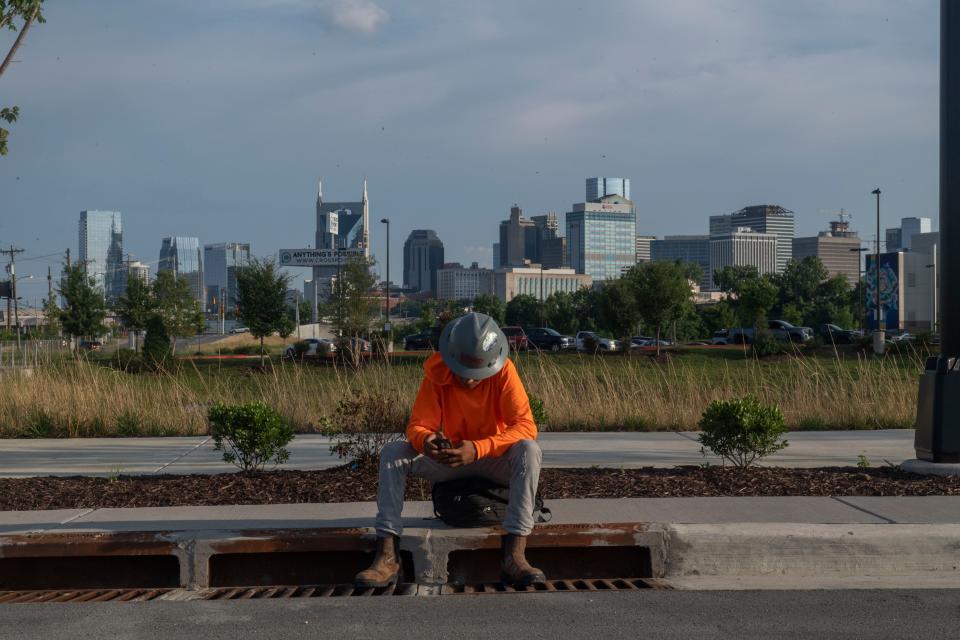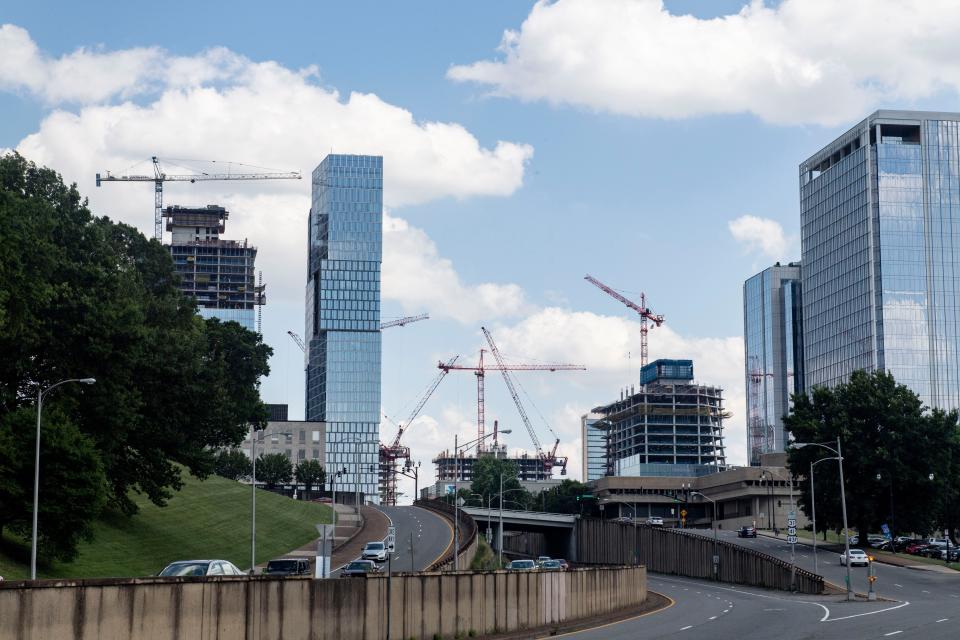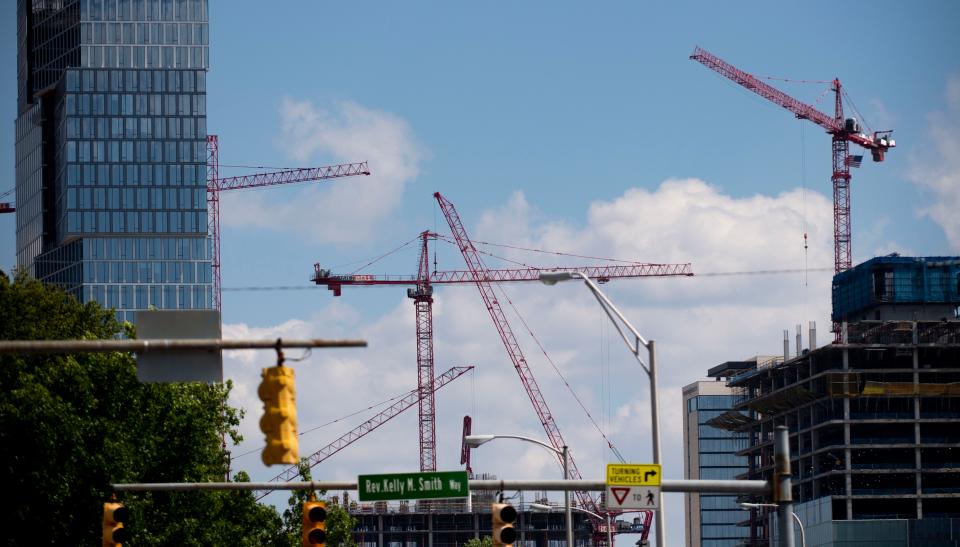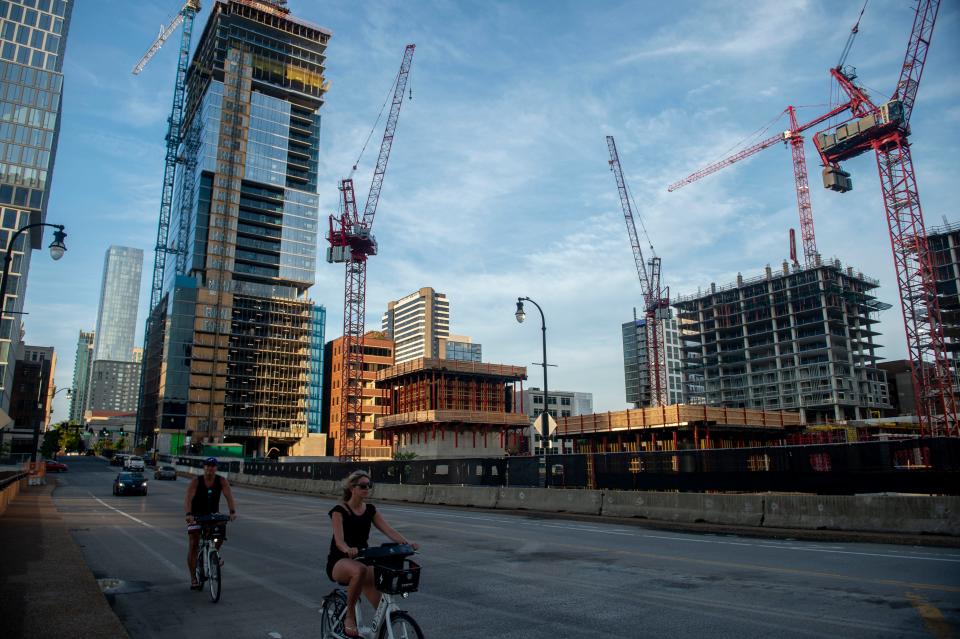Nashville's got growing pains. Here's how mayoral candidates would try to ease them
- Oops!Something went wrong.Please try again later.
In Nashville, growth looks different depending on where you're standing.
From one vantage point, it takes the form of an ever-changing skyline dotted with cranes, lively downtown crowds, the lights of a new soccer stadium, long-awaited bike lanes and rows of apartment buildings that sprouted over the last decade.
From another, growth looks like brake lights, construction barriers, potholes and stretches of city streets without sidewalks. It appears as moving trucks headed to nearby counties and mountains of trash towering in quickly filling landfills.
Nashville's next mayor will inherit it all.
A recent U.S. Census data review by the Nashville Area Chamber of Commerce showed the Nashville Metropolitan Statistical Area is once again seeing growth rates last seen in 2016, with the region adding about 35,624 new residents in 2022.
It's easy to point out the challenges on Nashville's horizon, and the mayoral candidates interviewed for this story ran the gamut: affordable housing, transit, public safety, schools, basic infrastructure and resource disparity between neighborhoods.
The hard part? Finding reliable funding streams to address those problems and deciding where to start first.
Between all of the campaigns, one message is clear: After decades of building Nashville's reputation as the "it" city for visitors, it's time for a sea change.

"This cycle of Nashville's growth is going to be where our ... investments really do start to remind people that Nashville is and should be, first and foremost, a great place to live," said two-term downtown Nashville Council member Freddie O'Connell.
'Education is at the root of it all'
For state Sen. Heidi Campbell, D-Nashville, the city's economic boom has come at a cost for affordable housing, traffic congestion and public safety, and "education is at the root of it all."
Campbell said Nashville's school system is comprised of "haves and have nots" — schools where parents can pour in time, energy and money to improve children's education, and underresourced schools in communities that cannot afford to provide that extra boost. Nashville needs to continue to push the state for more education funding, but in the meantime, she wants to institute community school organizers tasked with building support for less-resourced schools.
Vivian Wilhoite said some Nashville schools are overcrowded, and the city should use data to identify which schools should be expanded and the best places for new schools.
Alice Rolli takes an approach not dissimilar to the state's recent push toward school choice.
Nashville voter guide 2023: Our hub for mayoral, Council election coverage
The Middle Tennessee region is growing, she said, but Davidson County's population is hovering around 700,000. According to Rolli, partially to blame is a lack of "high quality options" in schools.
"We've got to have the dollars follow the kid, and we've got to honor the choice of parents," Rolli said.

Taking out the trash
One byproduct of Nashville's boom is mass quantities of trash, something Middle Tennessee landfills are quickly running out of room to cache.
Southern Services Landfill, owned by Waste Management Inc. of Tennessee, announced last summer it would stop accepting materials from third-party haulers at its construction waste landfill. Middle Point Landfill in Murfreesboro is expected to reach capacity between 2024 and 2029. Looming landfill closures and a lack of alternative locations in Middle Tennessee would more than double the cost to haul waste to distant facilities, according to the Nashville region's 2019 solid waste master plan.
For economic development and housing executive Matt Wiltshire, the sudden constriction of Southern Services Landfill is evidence of poor leadership and a strategy that's been "far too reactionary."
On the campaign trail: What will Nashville mayoral candidates do to protect renters?
"We need to anticipate these problems and work proactively so that there is time to make more reasonable adjustments that aren't so jarring and destabilizing to the marketplace," he said.
Nashville has a Zero Waste plan designed to eventually divert the city's entire waste stream away from landfills and into recycling, composting and reuse over the next 30 years. But the city hasn't progressed much, and even meeting the 30-year mark would be too late, according to O'Connell.
Metro's recent push toward stronger green building standards and steeper construction waste diversion requirements are good, O'Connell said, but handling waste remains a risk for Nashville's future.
He and state Sen. Jeff Yarbro, D-Nashville, plan to separate the city's solid waste services from Nashville's water department, a tenuous pairing that resulted from the creation of the Nashville Department of Transportation under Mayor John Cooper.
O'Connell and Campbell mentioned near-term options including the possibility of using barges to transport waste to landfills downriver. Campbell said Obion County has greenlighted accepting Nashville's waste.
Wilhoite and two-term Council member at large Sharon Hurt don't yet have clear plans to address Nashville's waste issues, but they agree that environmental justice is key — the fix, whatever it is, cannot disproportionately harm Black and brown communities.
Candidates agreed that Nashville and its surrounding region must aggressively pursue composting, reduction, reuse and upcycling strategies as recycling becomes less reliable.
Campbell said she's explored Knoxville company Eastman's work in upcycling plastics into sustainable materials. Yarbro wants to see Nashville transform its waste problems into economic development opportunities in growing renewable energy and waste reclamation industries.
"The cities that get ahead there will be doing the work that all cities are going to be doing eventually," Yarbro said.

Who pays for development
On the heels of a $2.1 billion deal to build a new Tennessee Titans Stadium and a string of incentives stretching back years to secure the relocation of companies like Oracle and Amazon, incentivized development is under intense scrutiny.
"I am absolutely opposed to how I think we've given our city away with tax rebates," Campbell said. "If Nashvillians have to pay taxes, then certainly the companies coming here should have to as well."
Wilhoite said companies who want to move to Nashville should be providing incentives to the city, not the other way around. Former educator Natisha Brooks said relocating businesses should be assessed a fee, and local small businesses should receive tax reductions just as new businesses do.
Yarbro said ideally, the federal government would intervene to stop cities from "competing in ways that are truly extractionary from the city," but within the current economic reality, he's not opposed to incentives. "There must be transparency, and the benefit should be clear to the taxpayers," he said.
Hurt said incentives are a "two-way street" and businesses must be held accountable.
O'Connell said Nashville needs to think in terms of what the city wants to attract or retain. The city has drawn an influx of top-2% earners, he said. Maybe it's time to consider seeking out creative manufacturing companies, accelerators or models that jumpstart small-scale entrepreneurs may benefit Nashville. Any incentives must come with an analysis of the costs and benefits.
"Generally speaking, it has made some sense to me that jobs grant incentives are pretty good, because you only produce the incentive on a per-job basis, and having more jobs in Nashville, generally speaking, is a good thing," he said. "But then our local small business community says, 'when are we going to get incentives like that?' and I want to make sure we're having that conversation."
Wiltshire agreed on the importance of incentives for small businesses, something he worked to shape under previous mayors' administrations that has longer-lasting community benefits.
Wiltshire and Campbell said there are cases where incentives may be considered.
"But the incentive really should be what kind of city we have," Wiltshire said. A high quality of life, talented workforce and a strong education system will draw people and companies in.
Rolli, Yarbro, O'Connell and Wilhoite support working with the state to establish the ability to levy impact fees — one-time fees paid by developers on new development — to help pay for the infrastructure, services and schools needed to support that development.
"I understand when people in Nashville don't want to see a new development because they don't trust the city to provide the transportation and infrastructure, because there are examples where we haven't," Yarbro said.
But creative solutions might not stick without state buy-in. O'Connell referenced Cooper's attempt to "make the success of our destination economy less excessive" by using surplus revenue from the Music City Convention Center to invest in affordable housing — a strategy torpedoed by state lawmakers in the last session.
"If we continue to try to do work to address cost of living and quality of life concerns of Nashvillians and we get thwarted by policies out of the state, that compounds the challenge," he said.

Reshaping the fabric of Metro
Here are each candidate's priorities and plans for reshaping Nashville's government.
Heidi Campbell wants to assess how Metro's current departments function before suggesting new offices or major changes, but she plans to "streamline" Metro operations to make the government more efficient. She'd also rely on the expertise of groups like the Civic Design Center, WalkBike Nashville, the Cumberland River Compact and others to inform growth "in a holistic way juxtaposed to a project-based way."
Natisha Brooks wants to institute mental health clinics in all areas of the county, set a salary floor of $70,000 for teachers and police officers with stipends for living in Davidson County, and return property and business taxes to pre-COVID-19 assessments. If Metro Council is reduced to 20 seats, she suggests 10 seats be appointed by the mayor (five Republican, five Democrat) with the remainder elected by citizens. Long-term residents of 30+ years should receive tax incentives, and fees may be considered for people moving to Nashville from out of state, she said.
Sharon Hurt's priority is "ensuring that every quadrant of the county gets equal opportunity and that resources are provided to those who have been disadvantaged in the past." She would set up an economic development office with ambassadors for each quadrant. Hurt said the Planning Department's operations may need to be changed "because it seems to me that the Planning Department has been running everything with all the development that we've seen without there being any real, true regulations in place to stop the gentrification."
Vivian Wilhoite is pushing for economic parity in Nashville's neighborhoods, giving more resources to areas most in need, and equally prioritizing city utilities and services. She advocates for mixed-income housing developments while maintaining Nashville's character. Wilhoite would create a small business development office and would prioritize competitive pay for Metro employees. She wants to see more minority representation on boards and commissions.
Jeff Yarbro aims to streamline Metro's permitting and inspection process to reduce barriers to correcting Nashville's housing shortage and reduce construction time for the neighborhoods experiencing new development. If Metro Council is reduced, Metro will likely need a "significant look" at other ways to ensure citizens would have the same level of service. He's also looking for ways to consolidate: "One of the things that always drives me crazy about government is the erection of silos, where numerous departments can turn into miniature fiefdoms and citizens have to go through the gauntlet in order to get the work they need done."
Alice Rolli's priorities include improving first-grade reading rates and strengthening Nashville's police force through investment and "resetting the attitude around policing." "If we want Nashville to have the best police force, we also ... with this election have to send the D.A. a message — and I think my candidacy does that — that says we cannot continue on this catch and release path indefinitely." Rolli would also overhaul the budget to "live within our means and not raise taxes" and contemplate redesigning the structure of Metro government should Nashville's council be reduced to 20 members.
Freddie O'Connell aims to "focus the investment strategy of the city on ourselves, rather than on public investment in destination scenarios." He worked to create a standalone Office of Homeless Services as a council member, which would likely be joined by a standalone housing office under his administration. He'd also create an Office of Opportunity to house economic development initiatives and plans, youth opportunity and workforce development programs, and entertainment strategy. O'Connell said he will prioritize appropriate pay for Metro employees and consulting metrics to determine where more staff is needed. Instead of large entertainment deals, he said, he would prioritize "making sure that everyone has a park or a library in their community, and can safely and conveniently access it."
Matt Wiltshire's main areas of focus are housing affordability, providing adequate infrastructure to match the city's growth and addressing the idea that "Nashville feels less safe." He doesn't plan on sweeping changes to Metro's structure, instead striving for "effective management of what already exists." He plans to aggressively pursue public-private partnerships, and federal and state funding opportunities to help Nashville work through its needs without "simply increasing Metro funding." He has experience being in the room as budget decisions are made, and decisions boil down to return on investment, which in government means determining the impact of the overall public good.
This article originally appeared on Nashville Tennessean: Nashville mayoral election: How candidates would address city's growth

